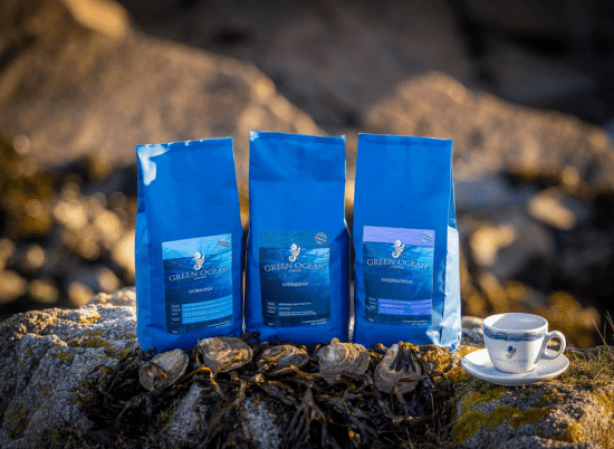Watermark Coffee is working with the Clew Bay Oyster Co-Op to restore oysters and reduce coastal erosion by using coffee purchases to fund seabed restoration.
BY VASILEIA FANARIOTI
SENIOR ONLINE CORRESPONDENT
Featured photo courtesy of Watermark Coffee
As the world grapples with environmental issues and climate change, it has become increasingly important for businesses to be more conscious of their ecological impact. One business that stands out in this regard is Watermark Coffee, founded by David Lawlor and his wife, Marguerite. The company takes a unique approach to sustainability by focusing on its Green Ocean Coffee initiative.
David, the company’s managing director, has chosen the ocean as their primary cause to support, and has partnered with local change-makers to do so. The Green Ocean Coffee project has been focusing its efforts on restoring the oyster population in Clew Bay, located in County Mayo in Ireland. We reached out to David and asked him about Green Ocean Coffee and the importance of businesses taking meaningful environmental action.

Restoring the Ecosystem Through Reviving Oysters
As a keystone species, oysters are a vital part of the local ecosystem and provide essential services, such as nutrient cycling and water filtration. The team at Watermark Coffee has made it their mission to revive the oyster population in Clew Bay.
David decided to start the project as a direct response to the climate crisis. “I believe that every effort, no matter how small, makes a difference. … (We) are now at a ‘make or break’ stage where we need to take every opportunity to make better climate decisions. Businesses have an even greater opportunity to make a difference in terms of their available resources and influence. We don’t have time to waste.”
But how can oysters help exactly? According to David, oysters help filter seawater. This allows sunlight to reach deeper into the ocean and promotes the growth of seagrass and other marine plants. ”Seagrass is a powerful carbon sink; according to the UN, seagrass absorbs atmospheric carbon at a rate of 35 times faster than the rainforest. The established oyster and seagrass/seaweed reef provides a perfect environment for juvenile fish to grow and avoid predation but also (reduces) coastal erosion.”

Watermark Coffee, from Bean to Sea
Together with the Clew Bay Oyster Co-Op, the Green Ocean Coffee project carried out the first phase of restoration in July 2022 to capture the essence of the project. To help oyster larvae settle and attach to the sea floor, they applied a layer of broken shell called culch. Their goal? Create an oyster reef by spreading culch and letting it develop over a period of three to four years.
Watermark Coffee is not only looking to help the local environment and revive Clew Bay’s oyster population, but they’re also committed to sustainability in their business operations. David explains, ”The link between coffee consumption and the restoration is simple. One square meter of seabed restoration is funded with each 1 kg bag of coffee purchased.”

The coffee itself is packaged in fully recyclable bags and purchased directly from farmers, giving Watermark a direct link between producers and the final coffee customer.
Local, Simple, Authentic Climate Action
The Green Ocean Coffee project is a long-term commitment, and Watermark Coffee is dedicated to making it a success. David believes that businesses have an even greater opportunity to make a difference. Their environmental emissions are much higher than the individual, but they also have more available resources and influence.
“The challenge for businesses is to engage in authentic climate action or carbon-reducing measures rather than being seduced by the allure of greenwashing, which tends to be vague in detail and grandiose in its claims. When it comes to climate action, authenticity trumps everything else,” he says.

David thinks businesses looking to promote their sustainability initiatives should ensure they demonstrate the worth of their initiative and keep it local and simple. “It is also important that the climate action culture of the business reflects the ethos of the initiative, as this will greatly improve its chances of being noticed in a crowded media landscape,” he says.
The Green Ocean Coffee Project is continuing its restoration work in Clew Bay for the next two to four years. They’re also looking to expand to other locations around the Irish coast, adapting the nature of the restoration to fit geographical requirements. They hope that companies will partner with them by selecting their coffee products as part of a larger effort to fund and spread awareness about this important cause.
ABOUT THE AUTHOR
Vasileia Fanarioti (she/her) is a senior online correspondent for Barista Magazine, and a freelance copywriter and editor with a primary focus on the coffee niche. She has also been a volunteer copywriter for the I’M NOT A BARISTA NPO, providing content to help educate people about baristas and their work. You can follow her adventures at thewanderingbean.net.
The post The Green Ocean Coffee Project Is Reviving Clew Bay appeared first on Barista Magazine Online.
This article was first published here.

You must be logged in to post a comment.